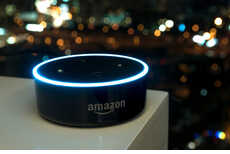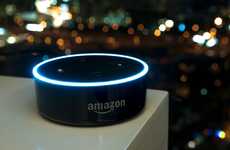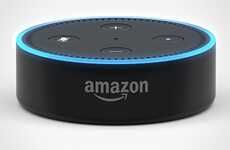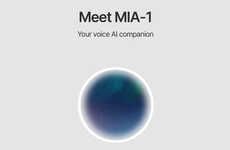
A New Speech System is Making Amazon's Alexa is More Life-Like
Ellen Smith — May 1, 2017 — Tech
References: developer.amazon
Alexa is a digital personal assistant designed by Amazon to compete with the likes of Apple's Siri. Alexa has been designed to listen and respond to voice commands to help the user get their job done and is capable of tasks ranging from listening to music, to creating to-do lists, and can even control other smart home products.
This week, Amazon announced the integration of Speech Synthesis Markup, which will allow Alexa to become more human-like. Up until recently, Alexa's speech has maintained robotic and monotone, but is now capable of whispering, varying its speaking sound, bleeping out words, and even adding pauses for punctuation to produce what is meant to be a more expressive and human-like experience.
Amazon says Alexa's new updates will allow for a "more natural voice experience." Amazon is hosting a webinar on May 18th where consumers are invited to learn more about the updates.
This week, Amazon announced the integration of Speech Synthesis Markup, which will allow Alexa to become more human-like. Up until recently, Alexa's speech has maintained robotic and monotone, but is now capable of whispering, varying its speaking sound, bleeping out words, and even adding pauses for punctuation to produce what is meant to be a more expressive and human-like experience.
Amazon says Alexa's new updates will allow for a "more natural voice experience." Amazon is hosting a webinar on May 18th where consumers are invited to learn more about the updates.
Trend Themes
1. Human-like Digital Assistants - The trend towards more human-like and expressive digital assistants is increasing, paving the way for improved user experience and customer engagement.
2. Speech Synthesis Markup Integration - The integration of Speech Synthesis Markup opens up opportunities for innovation in voice assistant technology and the potential to create more human-like, nuanced expressions in AI.
3. Adaptive Speech Recognition - New developments in adaptive speech recognition technology allow digital assistants to better understand context and tone, providing more personalized and accurate responses.
Industry Implications
1. Smart Home Products Industry - The smart home products industry stands to benefit greatly from advancements in human-sounding digital assistants, as they can perform an increasing number of tasks and interact with other technologies within the home.
2. Tech Industry - The tech industry is ripe with opportunities to explore and develop increasingly lifelike digital assistants, revolutionizing how people interact with technology in their daily lives.
3. E-commerce Industry - Incorporating more human-like digital assistants in e-commerce platforms and websites can improve customer engagement and enhance the shopping experience, leading to increased sales and customer retention.
1.1
Score
Popularity
Activity
Freshness























